 |
Vol VI No. 2 Summer 2015 |
||||||||||||||||||||||
|
Spend some time reflecting on the 2014-2015 school year. Write down what went well and how you can enlarge those practices in other areas of instruction. Talk with a colleague or knowledgeable friend about these jewels of practice, explaining the pros and cons of them to find ways to refine them further. With equal focus, write what didn’t go well, using the same cycle of discussion and refinement to determine ways to improve for next year. In essence, use trusted colleagues and friends to serve as your personal trainers for feedback. Just like any professional, from Tiger Woods to Josh Groban to Reese Witherspoon, everyone needs the chance to reflect and refine their abilities and talents. Attend a GCTM Summer Academy (Grades K-8) or a DOE Summer Professional Learning Institute (for Middle or High School). These two professional learning opportunities offer teachers the chance to work with other teachers to explore the revisions to the Georgia Standards for Excellence with exemplary resources developed specifically for them. This is the link to the registration for the GCTM Summer Academies and for the DOE Summer Professional Learning Institute. Read a good book. As a classroom teacher, I often found the only time I could devote to reading would occur during the summer break. May I suggest two books that particularly provide the opportunity to grow in your teaching philosophy? The first is Visible Learning for Teachers: Maximizing Impact on Learning by John Hattie which “synthesizes the results of more than fifteen years research involving millions of students and represented the biggest ever collection of evidence-based research into what actually works in schools to improve learning.”1 The second is Mindset: The New Psychology of Success by Carol Dweck. In this book, “Dweck explains why it’s not just our abilities and talent that bring us success–but whether we approach them with a fixed or growth mindset. She makes clear why praising intelligence and ability doesn’t foster self-esteem and lead to accomplishment, but may actually jeopardize success.”2 Determine to add one new strategy into your instructional practice next year. After the personal reflection, professional learning, and specialized reading suggested already, most likely you will find many new ideas that could be incorporated into your teaching. Focus on the integration of one new strategy until you and your students feel comfortable with it. It takes time to make new approaches feel automatic, so persevere when the first failures occur. Then, add another strategy while maintaining the quality of the first. It’s very difficult to do several new things well without being overwhelmed and giving up before really starting. And give yourself some grace, knowing, as you incorporate evidence-based strategies into your teaching practice, you are growing as a professional and providing strong learning opportunities for your students. Have a restful and rejuvenating summer! 1Visible Learning: Maximizing the Impact of Learning, Hattie, John, Routledge, London and New York 2Mindset: The New Psychology of Success, Dweck, Carol, Ballantine Books, New York
As I look back over the editions we have published, both paper and online, I am so thankful for those of you who have written articles, sent pictures, written copy for an ad, and sent suggestions as to how to make our journal better. It is time to give this job to someone with new ideas, so I hope you will support our new editor, Dr. Becky Gammill, and help her adjust to her new role. As to my future, I have new things to learn, new heights to climb, and new tasks to accomplish. For as long as I live, my plan is to use my ever-increasing knowledge to be a better person and a better teacher. My inspiration comes from my family, my friends and my students who have taught me the important things in life. The first is that people matter. Every student matters; every colleague matters, and even every parent matters. We must treat them each with respect, because they matter. The second important thing is to never stop learning – never stop wanting to know and do new things. As the salutatorian of our senior class said in his speech yesterday, “Remain curious as a child. Keep that child-like curiosity.” There is so much that we have yet to discover, and that is something we should instill in our students – the awe of learning new things. In the words of Edwin A. Abbott in the book FLATLAND, “. . . to be self-contented is to be vile and ignorant. To aspire is better than to be blindly and impotently happy.”
The tournament consisted of a very challenging written test of 45 multiple-choice questions and 5 free-response questions with a 90-minute time limit; 10 individual ciphering problems, each problem with a two-minute time limit; and a team round. The team round consisted of 12 problems for each team to solve while working together within eighteen minutes. The student with the best improvement at the state tournament over the previous year was given the Steve Sigur Award for Most Improved Performance. This award, named in honor of the great mathematician, teacher, and mentor Steve Sigur, went to Tony Zeng of Brookwood High School. Each participant and their school sponsor was given a 2015 State Tournament T-shirt. The top five teams and the top fifteen individuals are listed below. TOP TEAMS:
TOP INDIVIDUALS:
An item analysis of the competition problems is included here in PDF format. State Tournament registration is free, but schools must be invited. The next State Mathematics Tournament is scheduled for April 30, 2016.
The tournament is designed to challenge middle school students and to reinforce classroom skills. However, we also make sure the students have fun! At the conclusion of the tournament, students participate in a fun “Frightnin’ Lightnin’” Round, where students must be quick on the draw to answer math problems orally. The winners of this round get candy Trophies went to the top five teams and the top ten individuals. The top teams are below . TOP TEAMS:
One-hundred seven students from seventeen schools participated. Sponsors that are members of GCTM only had to pay a $10 registration fee or submit five multiple-choice questions for possible inclusion in a future tournament. The next GCTM middle school tournament is scheduled for April 23, 2016. We hope you will plan to bring a team of students. An item analysis of the competition problems is included here in PDF format.
Three-Act Tasks have three parts: (1) a motivating first act that engages and perplexes students, (2) a second act, driven by student information, which seeks a solution, and (3) a third act which facilitates student discussions and presentations of discovered solutions (Dan Meyer). Three-Act Tasks are applicable in classrooms of various subject areas and grade levels, and there are a growing number of online resources that provide a structure and a starting point for these engaging tasks. Figure 2: Act 1 of the Sugar Packets Task. For example, two bloggers who I follow that are proponents for Three-Act Tasks are Dan Meyer and Fawn Nguyen. Dan Meyer, the keynote speaker for the Georgia Mathematics Conference (GMC) in 2013, has been creating, using, providing, and professing the benefits of Three-Act Tasks for many years. Through his blog, he even provides a data base of over fifty tasks that he has created. (See Figure 1).
I first learned of Three-Act Tasks during his GMC presentation. Applying what I learned about Three-Act Tasks to a variety of classes in my middle school classroom, I found that liked the idea of proposing a scenario to my students, allowing them to come up with questions about the scenario which they find interesting, and then letting them choose a question to answer mathematically. I could use the same task with all of my students and the questions created would allow them to have a real choice in their learning. While initially brainstorming possible scenarios, I went online and found numerous creative ideas—many with videos—ready to be used. Soon, I had so many ideas that I had a difficult time choosing which scenarios to use. Throughout the past few years, I have used lots of Dan Meyer’s tasks, and a few have proven to be my favorites. The first Three-Act Task I used with both students and peers (in professional development) is the Sugar Packets task (Figure 2).
Act One begins with a video of a gentleman sitting at a lunch counter swallowing sugar packets. The two people on each side of him give him funny looks as they drink Coke and sweet tea. The video is used to launch the activity by having students reflect about what they have seen and generate a list of questions such as, “How many sugar packets are in a regular drink?” (Don’t worry, this question always comes up in some form, eventually.) Students continue to pose questions and are motivated to determine exactly how many sugar packets are in a Coke or other drinks, including energy drinks, sports drinks, and other soft drinks. In Act Two, students grouped themselves based on they wanted to research. At this point, I found differentiation to be simple because I could provide varied amounts of support per group according to the needs of the students. For example, I gave those who needed more support printed information about a sugar packet and a Coke, while other students who needed less support were set out to find this information using the internet, their own drinks they carried into class, or other resources. As students worked together, most used the concept of ratios to solve their individual problems. For Act Three, each group created an informational poster about their drink which included the mathematics used throughout the task. At the end of the work session, groups visited each other to compare their solutions. A rich discussion ensued, centering on comparing the different sugar levels in the variety of drinks students consumed daily. Many students stated that they planned on changing their drinking habits based on this task. While this wasn’t one of my goals, it was fascinating to see how students had taken true, “real-world” data and used it to make an actual life decision. Wow! Creating Three-Act Tasks doesn’t have to be stressful; just remember that the main focus of the task is to capture the student’s interest in a non-mathematical way. The first act engages students, the second act allows students to research something that they are questioning, and the third act allows students to share their solutions. When designing your own task, find something that will spark your students’ interests. For example, one of my colleagues used a huge bag of Jolly Ranchers to excite her students, which prompted questions ranging from “How many do I get?” to “How many cherry (or other flavored) Jolly Ranchers are in the bag?” Another strategy I have tried is to use a video of my family playing miniature golf. This ultimately guides my students to ask questions about angles. Three-Act Tasks may also be used in statistics. Have you ever used the M&Ms or Skittles task that helps students learn the properties of probability? This task could easily be converted into a Three-Act Task by simply providing a picture or video of the product and then allowing the students to generate questions, conduct research, and share their findings about the product. Many mathematical topics can be explored through a variety of student-generated questions, and Three-Act Tasks absolutely facilitate student-centered question-and-answer activities in a truly collaborative manner. Figure 3: Resource from the Georgia Department of Education The new 2015-2016 Effective Instructional Practices Guide (Figure 3) from the Georgia Department of Education includes more information regarding Three-Act Tasks, along with several web links. This is a great resource to use as you step into using Three-Act Tasks to engage all your students in mathematics.
Resources/Links: Karen Kline is a gifted certified teacher with 18 years of teaching middle and high school mathematics. She has presented at three GMC conferences, participates in KSU math circles, and was a teacher leader on KSU’s Math and Science Partnership grant.
Too much focus is on learning procedures without any connection to meaning, understanding, or the applications that require these procedures.(p. 3) In light of this reality, there are recommendations and guidelines to assist teachers in mathematics classrooms. Of the six guiding principles in this document, much focus is placed upon the principal of effective teaching and learning. The Teaching and Learning Principle states: An excellent mathematics program requires effective teaching that engages students in meaningful learning through individual and collaborative experiences that promote their ability to make sense of mathematical ideas and reason mathematically. (p. 5) To promote meaningful learning, mathematics classroom conversations and interactions must progress beyond a superficial level of basic recall and algorithm reproduction. The tasks and activities that students are asked to solve and the kinds of classroom discussions that take place emphasize what the teacher or educational institution deems important and essential. Students who begin with questions or tasks involving basic recall and algorithmic reproduction come to believe that that is what mathematics is – something that someone else does while they reproduce what the “real” mathematicians have invented.
Effective teaching of mathematics facilitates discourse among students to build shared understanding of mathematical ideas by analyzing and comparing student approaches and arguments. (p. 29)
Simply asking students to explain or reproduce a taught algorithm does not necessarily result in students building mathematical ideas. At times, such discourse can be found to undermine a student developing big ideas in mathematics. Principles to Actions (NCTM, 2014) 35) also states that educators should pose purposeful questions: Effective teaching of mathematics uses purposeful questions to assess and advance students’ reasoning and sense making about important mathematical ideas and relationships. (p. 35) In classroom mathematical discussions, the goal should be upon questions that encourage students to make sense of the mathematics in an intellectually autonomous environment. The Professional Standards for Teaching Mathematics (1991) suggests questions that are still relevant today: v Helping students work together to make sense of mathematics.
v Helping students work to rely more on themselves to determine whether something is mathematically correct.
v Helping students learn to reason mathematically.
v Helping students learn to conjecture, invent, and solve problems.
v Helping students to connect mathematics, its ideas, and its applications.
As the mathematics education community continues to push for engagement of all students in rich mathematics learning, being cognizant of the kinds of questions that are posed in mathematics discussions can support in this endeavor. References National Council of Teachers of Mathematics. (1989). Curriculum and evaluation standards for school mathematics. Reston, VA: NCTM. National Council of Teachers of Mathematics. (1991). Professional standards for teaching mathematics. Reston, VA: NCTM. National Council of Teachers of Mathematics. (1995). Assessment standards for teaching mathematics. Reston, VA: NCTM. National Council of Teachers of Mathematics. (2000). Principles and standards for school mathematics. Reston, VA: NCTM. National Council of Teachers of Mathematics. (2007). Mathematics teaching today: improving practice, improving student learning. Reston, VA: NCTM. National Council of Teachers of Mathematics. (2014). Principles to actions: ensuring mathematical success for all. Reston, VA: NCTM. Additional Resources http://www.primas-project.eu/servlet/supportBinaryFiles?referenceId=4&supportId=1362 http://www.edu.gov.on.ca/eng/literacynumeracy/inspire/research/CBS_AskingEffectiveQuestions.pdf http://www.ijhssnet.com/journals/Vol_3_No_17_September_2013/23.pdf http://www.utdanacenter.org/mathtoolkit/support/questioning.php Sandra Davis Trowell, Ph.D., is an assistant professor in the Mathematics & Computer Science Department at Valdosta State University. She is interested in how students learn mathematics and enjoys working with prospective and practicing teachers.
As mathematics educators, this is our motivation for doing the job we love so much-----teaching! As we strive to help our students reach their potential, we must continue to fill our “tool boxes” with effective teaching practices. Once again this year GCTM is providing one of the best opportunities for professional development, the 2015 Georgia Mathematics Conference. This year’s theme: “Growing Student Potential in Mathematics” is built around the Eight Effective Teaching Practices outlined in NCTM’s publication, Principals to Action. The Georgia Mathematics Conference Board is busy preparing for this great event and we need YOU. Every year, this conference features many of Georgia’s best educators and we want to continue to increase that number. There is no better place to show off the great things that are happening in classrooms across our state than at Rock Eagle. If you are willing to present or know someone who would be willing to present, the speaker proposal forms will be posted at the GCTM website very soon or email me. Join us October 14 – 16, 2015 at Rock Eagle!
Within each issue, eREFLECTIONS will capture and showcase our readers’ ideas and thoughts about content ideas and best practices of teaching mathematics. We welcome authors of all experience levels, educational backgrounds, and grade-level specialties to contribute tips and tricks, lesson plans, mathematical puzzles, reflections, words of wisdom, and research. Over the next year, our issues will focus on a theme of “Diving Deeper” in order to highlight how mathematics teachers help students make sense of mathematics on a deeper level through favorite lessons, resources, and professional development opportunities. The contributions of our stakeholders help this publication grow alongside our community and provide an ear and voice for those who have a passion for students, teaching, and mathematics. Do you have something to share? Please consider being part of eREFLECTIONS team by answering our Call for Manuscripts.
Please visit your home page on the GCTM site. Update your information including school name, grade level and alternate email. Make your home email the principal email used to send you eREFLECTIONS and other information. There are at least 4 school systems in Georgia that have blocks on email info we send. Home address is better! Volunteers Are you willing to be a GCTM helper? It takes many hands to have a conference, academies, competitions, and a journal! If you can lend your hands and heart, just enter your interests in the volunteer field on your personal record on the database. Missing Persons Can you help us locate addresses or information about the following members. Mail has been returned as Unknown. Any help you can give will be appreciated. Send any info to secddc@aol.com.
Student Members If you are completing your degree we encourage you to continue your membership as you begin your teaching career. The fee of $20 is just a small amount to spend for all that GCTM offers you! Be sure to update your email address as it changes. A home address will assure you receive information sent by GCTM. If you are continuing your college status, be sure to update your Snail and email addresses, and renew your account for the next year!
All of this and more in a two-day professional development opportunity! Each session will be grade-specific and held at your choice of four locations/dates. The cost is only $120 non-member/$90 member for the entire 2-days packed with great ideas and materials full of rigor and relevance to use in your classroom this fall.
The 2015 NCTM Annual Meeting & Exposition was held in Boston, Massachusetts, April 15-18, 2015. Nearly 10,000 mathematics educators were gathered for the event! NCTM President Diane Briars presented Major Initiatives for NCTM at the Affiliates Delegate meeting. Major Initiatives for NCTM include: The 2015 NCTM Annual Meeting & Exposition was held in Boston, Massachusetts, April 15-18, 2015. Nearly 10,000 mathematics educators were gathered for the event! NCTM President Diane Briars presented Major Initiatives for NCTM at the Affiliates Delegate meeting. Major Initiatives for NCTM include:
The NCTM website has been remodeled! Visit www.nctm.org to check out the new format! The NCTM-Hunt videos and Principles to Actions resources are already available there. Delegates Passed One Resolution
Any passed resolutions are forwarded to the NCTM Board of Directors as recommendations for review at its July meeting. Board’s actions on each resolution will be posted online in August. Affiliate leaders and Delegate Assembly participants will be notified through the Affiliate News electronic newsletter when the Board’s actions have been posted this fall. 2014 Summer Interactive Institutes for Pre-K–12
For more information, go to: http://www.nctm.org/institutes/.
NCTM Boston Affiliates Meeting 2015 Cathy Martin, NCTM Board of Directors, Dottie Whitlow, NCTM Representative, Betty Long, NCTM Southern Regional Director Principles to Actions The widespread adoption of college- and career-readiness standards, including adoption in the United States of the Common Core State Standards for Mathematics (CCSSM) by forty-five of the fifty states, provides an opportunity to reenergize and focus NCTM’s commitment to significant improvement in mathematics education. Thus, the release of NCTM’s latest publication, Principles to Actions, which is designed to fill the gap between the development and adoption of CCSSM and other standards and the enactment of practices, policies, programs, and actions required for their widespread and successful implementation. The overarching message is that effective teaching is the nonnegotiable core that ensures that all students learn mathematics at high levels and that such teaching requires a range of actions at the state or provincial, district, school, and classroom levels. Get your copy at nctm.org shop online.
|
Table of Contents President's Message - by Kaycie Maddox My Final Edition - by Cheryl Hughes GCTM State High School Mathematics Competition - by Chuck Garner, VP for Competitions GCTM State Middle School Math Tournament News - by Chuck Garner, VP for Competitions Websites to Check Out this Summer! Three-Act Tasks for Every Classroom - by Karen Kline Questions?! - by Sandra Davis Trowell Georgia Mathematics Conference 2015 - by Tammy Donalson A Note from Our New Editor - by Rebecca Gammill Celebrating Student Voices: The Power of the Instructional Shifts Number Puzzle Fun - by "Quadrant Dan" Your Membership Matters! - by Susan Craig, Membership Director NCTM Report - by Dottie Whitlow
|
||||||||||||||||||||||
|
Georgia Council of Teachers of Mathematics | PO Box 5865, Augusta, GA 30916 | 1-855-ASK-GCTM |
|||||||||||||||||||||||

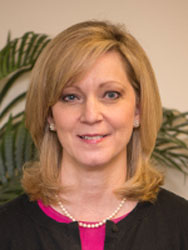 As
the school year draws to a close, anticipation of summer events is a
welcome diversion to the often tedious tasks here at the end.
Keeping students engaged in learning and cleaning up classrooms can
be taxing to say the least. Once the summer break has finally begun,
though, this summer offers opportunities to polish the art of
teaching in your classroom for next year. Of course, you’ll need to
relax, spend time with family, and sleep late, if possible, but you
might consider the following suggestions that can have a big impact
on your teaching practice for August 2015:
As
the school year draws to a close, anticipation of summer events is a
welcome diversion to the often tedious tasks here at the end.
Keeping students engaged in learning and cleaning up classrooms can
be taxing to say the least. Once the summer break has finally begun,
though, this summer offers opportunities to polish the art of
teaching in your classroom for next year. Of course, you’ll need to
relax, spend time with family, and sleep late, if possible, but you
might consider the following suggestions that can have a big impact
on your teaching practice for August 2015: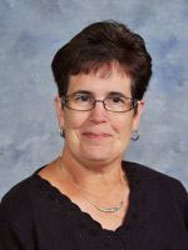 Contrary
to how that title might sound, I am not retiring from teaching, only
handing the job of Editor of this journal to another.
Contrary
to how that title might sound, I am not retiring from teaching, only
handing the job of Editor of this journal to another. The 39th annual GCTM State Math Tournament was held
at Middle Georgia State College in Macon, Georgia on April 25, 2015.
Schools are invited to the state tournament based on their
performance on previous Georgia tournaments throughout the 2014-2015
school year. Thirty-four invited schools attended this year’s state
tournament. Four students are selected to represent each school.
Twenty individuals were also invited to try-out for the state-wide
Georgia ARML team, making a total of 154 participants.
The 39th annual GCTM State Math Tournament was held
at Middle Georgia State College in Macon, Georgia on April 25, 2015.
Schools are invited to the state tournament based on their
performance on previous Georgia tournaments throughout the 2014-2015
school year. Thirty-four invited schools attended this year’s state
tournament. Four students are selected to represent each school.
Twenty individuals were also invited to try-out for the state-wide
Georgia ARML team, making a total of 154 participants.
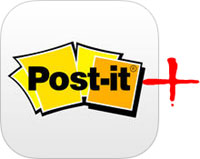


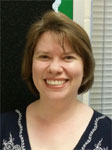 Three-Act
Tasks are gaining popularity through various blog sites and the
Georgia Department of Education even advocates and provides
resources for them because they provide a simple and refreshing
structure for teaching mathematical concepts. So what are Three-Act
Tasks and how can they contribute to your repertoire of
instructional strategies?
Three-Act
Tasks are gaining popularity through various blog sites and the
Georgia Department of Education even advocates and provides
resources for them because they provide a simple and refreshing
structure for teaching mathematical concepts. So what are Three-Act
Tasks and how can they contribute to your repertoire of
instructional strategies?

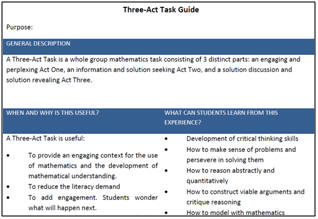


 In NCTM’s recent document, Principles to Actions: Ensuring
Success for All (2014) examines the progress in mathematics
education since the initial publication of the Curriculum and
Evaluation Standards for School Mathematics (NCTM, 1999). While
mathematics education has been at the forefront of education reform,
there is still much to be accomplished if our mathematics classrooms
are to be rich learning environments that focus upon sense making
rather than rule and procedure driven spaces. Principles to
Actions (NCTM, 2014) states that
In NCTM’s recent document, Principles to Actions: Ensuring
Success for All (2014) examines the progress in mathematics
education since the initial publication of the Curriculum and
Evaluation Standards for School Mathematics (NCTM, 1999). While
mathematics education has been at the forefront of education reform,
there is still much to be accomplished if our mathematics classrooms
are to be rich learning environments that focus upon sense making
rather than rule and procedure driven spaces. Principles to
Actions (NCTM, 2014) states that 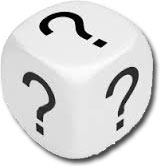 Choosing and
selecting rich mathematical tasks and problems better lends itself
to students recognizing that mathematics is a human activity that
each one has the ability to do. Rich tasks also lend themselves to
meaningful mathematical discourse – a goal that is seen in a number
of mathematics education reform and standards documents (NCTM, 1989;
NCTM, 1991; NCTM, 1995; NCTM, 2000; NCTM, 2007; NCTM, 2014).
Principles to Actions (NCTM, 2014, p. 29) specifically states
that educators should facilitate meaningful mathematical
discourse:
Choosing and
selecting rich mathematical tasks and problems better lends itself
to students recognizing that mathematics is a human activity that
each one has the ability to do. Rich tasks also lend themselves to
meaningful mathematical discourse – a goal that is seen in a number
of mathematics education reform and standards documents (NCTM, 1989;
NCTM, 1991; NCTM, 1995; NCTM, 2000; NCTM, 2007; NCTM, 2014).
Principles to Actions (NCTM, 2014, p. 29) specifically states
that educators should facilitate meaningful mathematical
discourse: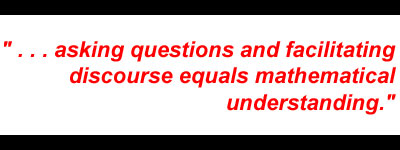
 In facilitating rich
mathematical course and posing purposeful questions, it is
imperative to remember to honor and respect students’ mathematical
ideas. Students are accustomed to classrooms where a question asked
implies that their idea or answer is incorrect. This means that a
teacher must make it clear to students that questions do not imply
that an idea or solution is incorrect but that an important part of
doing and learning mathematics involves discussion. Another
important issue for teachers is to remember to wait after
posing a question so that students have adequate time for
reflection. Waiting can indeed be an important part of the
discussions and questions.
In facilitating rich
mathematical course and posing purposeful questions, it is
imperative to remember to honor and respect students’ mathematical
ideas. Students are accustomed to classrooms where a question asked
implies that their idea or answer is incorrect. This means that a
teacher must make it clear to students that questions do not imply
that an idea or solution is incorrect but that an important part of
doing and learning mathematics involves discussion. Another
important issue for teachers is to remember to wait after
posing a question so that students have adequate time for
reflection. Waiting can indeed be an important part of the
discussions and questions. 
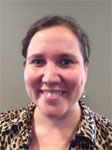 I cannot thank Cheryl Hughes enough her incredible support
throughout my internship which has prepared me to become the new
eREFLECTIONS Editor. Simply put, she is an inspiration. As I embark
on this exciting new journey, I can only hope to continue in her
footsteps by providing high-quality materials that enlighten,
inform, and excite mathematics teachers throughout the state.
eREFLECTIONS will continue to be a preeminent platform for the
voices of mathematics teachers and teacher educators as the
landscape of teaching and learning mathematics changes through
curriculum reform, technological innovations, and educational
research. Readers can depend on each issue to describe how GCTM
provides professional development opportunities and represents our
readers’ voices on a statewide and national level through events
like Math Day at the Capitol, NCTM Conferences, STEM-Georgia
Conferences, and the Biennial Institute for Georgia Legislators.
I cannot thank Cheryl Hughes enough her incredible support
throughout my internship which has prepared me to become the new
eREFLECTIONS Editor. Simply put, she is an inspiration. As I embark
on this exciting new journey, I can only hope to continue in her
footsteps by providing high-quality materials that enlighten,
inform, and excite mathematics teachers throughout the state.
eREFLECTIONS will continue to be a preeminent platform for the
voices of mathematics teachers and teacher educators as the
landscape of teaching and learning mathematics changes through
curriculum reform, technological innovations, and educational
research. Readers can depend on each issue to describe how GCTM
provides professional development opportunities and represents our
readers’ voices on a statewide and national level through events
like Math Day at the Capitol, NCTM Conferences, STEM-Georgia
Conferences, and the Biennial Institute for Georgia Legislators.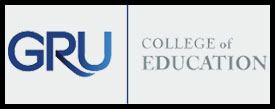 CSRA
RESA and Georgia Regents University will present a two-day
conference to showcase educators from across the CSRA to share
strategies that increase student performance and mastery of the
instructional shifts in literacy and numeracy. Speakers include Dr.
Zach Kehlear, Dean of the GRU College of Education and former
Associate Dean for the University of South Carolina College of
Education; and Dr. Naesha Parks, Principal of Evans Elementary
School and author of the book "The Heart Feels First."
CSRA
RESA and Georgia Regents University will present a two-day
conference to showcase educators from across the CSRA to share
strategies that increase student performance and mastery of the
instructional shifts in literacy and numeracy. Speakers include Dr.
Zach Kehlear, Dean of the GRU College of Education and former
Associate Dean for the University of South Carolina College of
Education; and Dr. Naesha Parks, Principal of Evans Elementary
School and author of the book "The Heart Feels First."
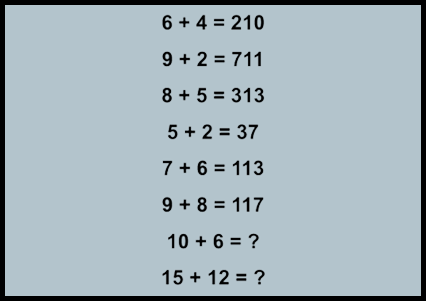
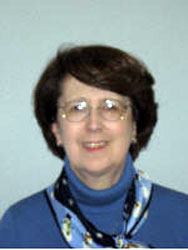 Spring Cleaning
Spring Cleaning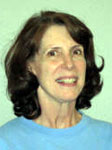 Attend this year’s GCTM’s Summer
Academy for K-8 teachers:
Attend this year’s GCTM’s Summer
Academy for K-8 teachers: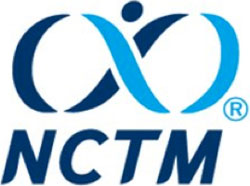 NCTM Annual Meeting & Exposition Review
NCTM Annual Meeting & Exposition Review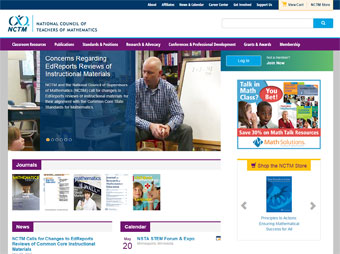
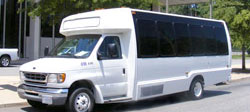 One resolution was passed by the 66th Delegate
Assembly. It requested that NCTM ensure that transportation is
provided and available to delegates when Affiliate Delegate meetings
are scheduled to begin or end during times that the NCTM shuttle
service is not in service.
One resolution was passed by the 66th Delegate
Assembly. It requested that NCTM ensure that transportation is
provided and available to delegates when Affiliate Delegate meetings
are scheduled to begin or end during times that the NCTM shuttle
service is not in service. Join
us in San Diego or Chicago this summer for NCTM's Interactive
Institutes. Sessions begin in July, and topics are
Join
us in San Diego or Chicago this summer for NCTM's Interactive
Institutes. Sessions begin in July, and topics are